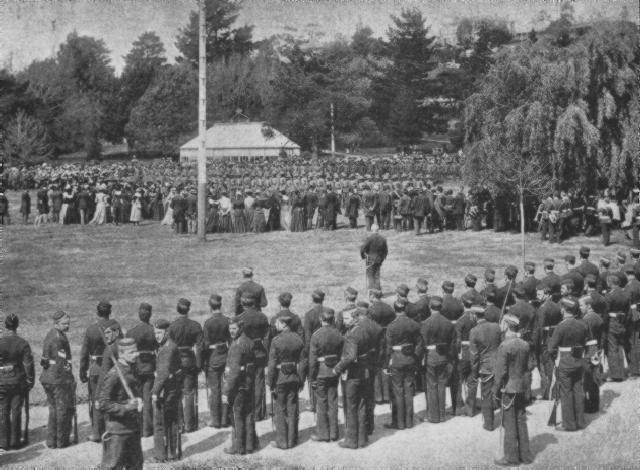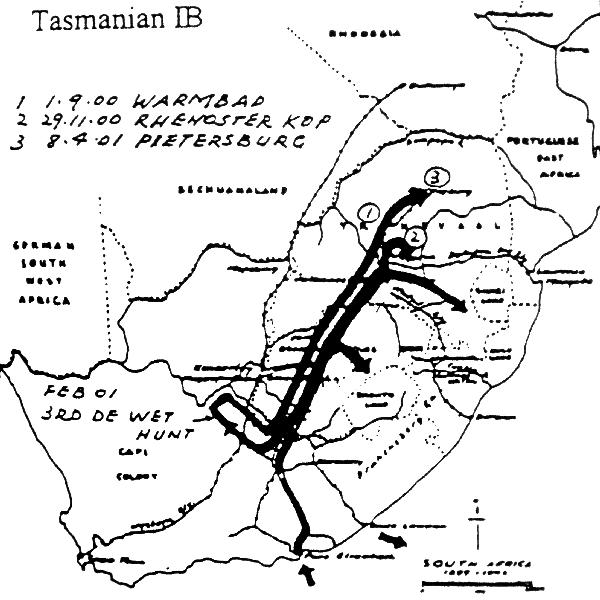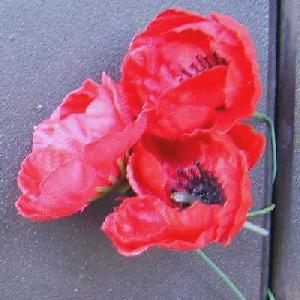Topic: BW - Tas - 1TMI
1st TMI
1st Tasmanian Mounted Infantry
Departure

The following is a transcription of an article that appeared in The Hobart Mercury, Friday 27 October 1899, at page 3.
AUSTRALIAN CONTINGENT FOR SOUTH AFRICA.
INSPECTION OF THE TROOPS.
ADDRESS BY THE ADMINISTRATOR.
RECEPTION AND BANQUET.
DEPARTURE OF THE CONTINGENT.
Shortly after 6 o'clock this morning the members of the Tasmanian contingent will leave Hobart, en route to South Africa. The event is certainly a unique one in the history of the colony, and for that reason, as well as for the stirring sentiment that surrounds the mission upon which the troops are engaged, the public have been aroused to an unusually high pitch of enthusiasm. A parade of troops is always an impressive scene. The memories and traditions which are inseparably associated with military life naturally stir public feeling; and such feeling becomes intensified when a parade of troops is a movement preparatory to the departure of soldiers for the scene of active warfare.
The knowledge that a contingent of men have during the past week been drilled seven hours daily to render them efficient for duty on a field of battle has certainly excited the sentimental feelings of the people of Hobart.
The men were busy at the barracks yesterday in completing all detailed arrangements connected with their equipment. A certain amount of drill was done, and the men have creditably mastered the difficulties of the various movements.
Colonel Legge speaks very highly of the marked improvement in the appearance of the troops, who have been most attentive to their instructors.
The men, headed by the Headquarters Band, marched to Franklin-square at 5 o'clock yesterday afternoon, and were inspected by His Excellency the Administrator. Possibly, on no previous occasion was the square a scene of greater interest. As early as 4 o'clock people secured prominent positions, which they retained until the contingent arrived. All who could possibly get positions in the square did so, and Macquarie-street was also crowded with spectators. Every available window that afforded a sight of the square was likewise occupied, and waving handkerchiefs and encouraging cheers could he seen and heard in all directions.
Among others present on the steps of the Law Department were the members of the Ministry, various Members of Parliament, Colonel Legge, and staff officers.
The contingent was drawn up in front of the entrance to the Law Department, and as his Excellency the Administrator, accompanied by Mrs. Dodds and Mr. Warren Dodds (Private Secretary) arrived the Royal salute was given, and the Headquarters Band played the National Anthem.
His Excellency then inspected the men, after which he delivered the following address:-
Officers and Men of the Contingent, I congratulate you upon your smart and soldierly appearance, and I notice with great satisfaction the improvement which a week's training has made in you. As Her Majesty's representative in this colony I wish to thank you for this proof of your devotion to your Queen and your loyalty to the British Empire. Each one of you is leaving his home to bear the privations of a soldier's life, not so much because his help is needed, but because he wishes to show England that her sons are ever ready to help her cause. The rising in South Africa is not one that threatens in the least degree the stability of the Empire, and a comparatively small number of British soldiers probably would be quite adequate to assert British rights and protect British interests. Already a handful of British troops at Glencoe have balanced the account of Majuba Hill, and have shown what valour can accomplish against heavy odds. But you, as British subjects, feel that you would like to share in your nation's work in the cause of right, and be more than silent spectators of her victories. And England has accepted your services, not because she needs them, but much as a loving parent accepts with proud feelings a service of affection and devotion from an offspring. But you have done rightly in offering your help, if only in grateful appreciation of the protection you receive, and. the privileges you enjoy under the great Empire to which you belong. You have done more than this; you have given an object lesson to the whole world of the homogeneousness of our Empire, and you have encouraged the hopes of"All the loyal hearts who longYou may rest assured that wherever the English flag waves the action of these colonies in sending men for service in South Africa will be viewed with national pride. You have touched the chord of national sentiment, and it will reverberate throughout the world. I will not presume to attempt to instinct you as to your duties. The Commandant, Colonel Legge, has already given you sound advice as to what is necessary to make a good soldier, but this much I may say without presumption, willing obedience to orders, and strict attention to every duty, form the groundwork of success. Each man must perform his allotted task thoroughly, oven in matters of the smallest detail, and leave the rest in charge of a stronger hand. To the men of the contingent I think that I can confidently say, you are commanded by a soldier whose fitness for the position is undoubted, whose personal courage is beyond question. In Captain Cameron you have a tried soldier, who has seen active Service under one of England's greatest Generals, Field-Marshal Lord Roberts of Kandahar. It is more than probable that you will be the only company of all the Australian forces enjoying the proud distinction of being led by a man who, with his regiment, went to the relief of Kandahar in that memorable and historic march from Cabul. Your captain will no doubt require from you strict attention to discipline, because he knows how much depends upon it, but he will, in return, see that you are well cared for, and that others do their duty by you, and there will be no danger, no privation to which you are exposed that he will not share with you. Exemplifying the motto on his crest – Pro Rege et Patria - he has, like you, offered his services for patriotic reasons, and if I freely translate that motto as meaning on this occasion "for my Queen and my Country," I shall rightly express the sentiment which moves every man of this contingent, a sentiment which throughout our history has produced the most splendid deeds of heroic bravery and unselfish devotion. Your other officers and non commissioned officers have been specially selected on account of their qualifications for their duties, and I think that, long before the campaign is over, officers and men »ill mutually respect and feel confidence in each other. I dare not trust m\self to speak of the inhuman conduct of our enemies, lest I should express myself in terms unsuited to this occasion, but I glory in the knowledge that whatever others may do, helpless women and children wounded and defenceless men, are, to British troops, objects of compassionate care and protection rather than victims of racial hatred and barbaric cruelty We have been forced into this quarrel for, true to her traditional policy, England has shown the must patient forbearance in her endeavours to preserve peace. The issue is not doubtful, for this is no Titanic struggle. The time is not yet when even the most powerful enemy can with impunity insult the British nation, or when the insignificant authors of a turbulent rising can without chastisement, yelp at the British flag. The braggarts who talked at chasing Englishmen into the sea will understand the fatuity of then boasting, and feel then utter helplessness when confronted with British guns. The rights of our countrymen will be maintained and their liberties assured. And if, perchance, sacrifices have to be made, the punishment meted out to the wrongdoer will be correspondingly severe. Ere long the English flag will again float peacefully and triumphantly over British possessions in South Africa, and order will be restored. All questions of racial supremacy will be settled, and when peace and prosperity again rest upon the land, they will make their abiding home under the protecting influences of a mighty Empire, whose beneficent rule has always made for peace and civilisation, and the happiness of the world. I wish you "Godspeed." Yon leave us .Filled with admiration at your noble example. You remind us how the manhood of a country should uphold the national honour, and we know that the fair fame of Tasmania is safe in your keeping. We recognise in your action the patriotism of kinship with all its passionate affection, and all its generous sacrifice. We shall watch with the keenest interest your every movement, and we shall pray for your safe return; and when the time comes we shall receive you back with full hearts. And now it only remains forme to give you the crowning honour of this occasion, a message from your Queen. Her Majesty commands me to deliver to you this message: - “Her Majesty the Queen desires to thank the people of Tasmania for their striking manifestation of loyalty and patriotism in their voluntary offer to send troops to co-operate with Her Majesty's Imperial Forces in maintaining her position and the rights of British subjects in South Africa. She wishes the troops God-speed and a safe return." The contingent gave a second Royal salute at the conclusion of His Excellency's address as a special mark of their respect.
To keep our English Empire whole."
Mrs. Dodds then presented a silver bugle to Captain Cameron for the bugler of the contingent. She said:
“It gives me great pleasure to present to you this bugle. May it always call you to a service of honour and devotion, such as that you now undertake I feel proud of you, my fellow countrymen, who are setting such a noble example, and I wish you God-speed."
The bungle was the gift of Mr. H. E. Smith, late lieutenant and adjutant of tho Buckingham Rifles, who, in the course of a letter to the Minister of Defence, asked permission to present the bugle to the contingent.
After the bugle had been presented loud cheers were given for the members of the contingent.
The members of the contingent were then marched to the Temperance-hall to the reception given by the Mayoress.
Further Reading:
1st Tasmanian Mounted Infantry
1st Tasmanian Mounted Infantry, Roll of Honour
Battles where Australians fought, 1899-1920
Citation: 1st Tasmanian Mounted Infantry, Departure





